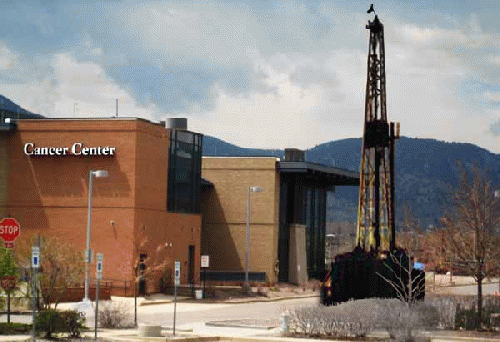Fracking the Cancer Center by jdial, photo credit
I was under the impression that the tenor of this lecture
series on hydraulic fracturing at the University of Colorado was to be
neutral. Yet all but one speaker, scientist
Gabrielle Petron, ranged from shoulder-shruggingly resigned to essentially aquiver over fracking. The new neutral, it
seems, is see no, hear no, speak no, and negatives need not apply.
Where did Bernie Goldstein[1], a public-health physician,
stand on this moiety? Well, he began his
talk, titled Does Living Near
Hydrofracturing Activity Put Our Health at Risk?, by announcing that there
is no way we'll get over our need for fossil fuels in the next several decades, and that in that time every tight-shale formation in the US will entirely be drained of its bounty to fuel our every need. These continental tight-shale formations are ours, all ours, with no
other nation able to get at them them (unlike the floor of the Gulf),
so we can take our time. As for the
Gulf, there we'd better get busy, before anyone else gets ideas about what is rightfully ours.
During the Gulf spill--remember that slow-motion, ongoing
calamity?, which Goldstein
wrote about, British Petroleum whose rig exploded was adamant that constituents
of Corexit, the chemical applied by the ton to make the oil disappear (but not
go away), remain unknown. Goldstein
believes that industry hurts itself with excessive opacity around its
practices; he said BP needn't have been so secretive. I find that sentiment puzzling since Corexit
turned out to be more
toxic than the gushing oil itself (a peer-reviewed study in Environmental Pollution reported that crude oil combined with
Corexit becomes 52 times more toxic), disrupting the food chain of the entire
region.
Meanwhile, back on the land ...
As to the burning, no pun meant, question of whether
proximity to noxious fumes might have a negative impact upon one's health,
well, it's complicated. First some
geology. In these talks and elsewhere
we've heard about shale gas and tight shale.
They are both unconventional resources within which natural gas was
fairly well corked until hydraulic
fracturing released the genie. In
both instances, shale gas and tight shale, natural gas is secreted in tiny
pockets within layers of rock like air pockets in baking bread, as poetically told by Shell. There is need for
chemicals to "slicken" and make penetrable the fluid going down, where it mixes
with more bad company before it all eructates.
As Cornell University's Anthony
Ingraffea points out, most other manufacturing from automobiles to Xeroxes is ensconced inside buildings within zoned industrial areas. Now the hydrofracturing industry locates
their industrial spaces inside our fields and forests, beside and above our waterways, and
increasingly proximate to our schools, hospitals, and homes.
Goldstein did not spend much time on the medical effects of
fracking on people, ostensibly because there is not much data. Data is scarce because the industry is not
providing it and actively prevents its egress. Although Goldstein soft-pedaled this
question, other toxicologists
are not so sanguine; this website provides information and advice to people
whose lives have been disordered by gas extraction.
One did slip by.
During three years of monitoring,
McKenzie and
colleagues at the Colorado School of Public Health found potentially toxic
chemicals airborne near wells in Garfield County, Colorado, and concluded that
it is worse to be closer than further from well sites.
At least that's settled.
Goldstein does have one quibble with fracking. What goes down may be unpalatable to folks
other than Governor Hickenlooper, but what returns is worse--saltier
than seawater, pregnant with metals, and often radiogenic. Goldstein thinks there is too much emphasis
on formulas for fracking fluid and too little on what flows back, although, being from
Pennsylvania, he envies our ability here in the West to insouciantly inject that
nasty stuff back to the bosom of the earth.
They can't do that there; geology won't let them. Geology might not let us do it anywhere, but
it may take time to notice.
Flowback might be further complicated by what happens
when chemicals are exposed to high underground temperatures. Toxicologies might change. Synergies might form and, gang-like, further imperil.
The doctor differentiated "accidents" such as a rig being
hit by lightning or a raging bull and "incidents", which are accidents that
would have been preventable had attention been paid. To prevent incidents, Goldstein allows, the
industry needs vigorous oversight.
Speaking of which, there was a recent incident
near Parachute, Colorado. It really wasn't so recent. It was some time around March 2013--it was not announced--that Williams Energy spilled over 240 barrels of a mysterious
"liquid natural-gas product" into the ground.
And speaking of oversight, the Environmental
Protection Agency put the perpetrator, Williams Energy, in charge of the
clean-up and of protecting surface water.
Yet benzene
levels in Parachute Creek have crept above levels that are safe to drink. However, the state doesn't consider the creek
a source of drinking water (did someone tell the wildlife?), and no fines were levied. With oversight so vigorous, no wonder people chafe.
Public-trust issues positively plague the natural-gas
industry. Take the psychosocial effects
of fracking--discomfiture induced, for example, when people receive false or
incomplete pre-lease information, somewhat like the pledges of a swain that
disperse once the ink is dry. Did I mix
my metaphors? If nothing else,
contradictory assertions breed confusion.
You'll hear that fracking has been around for 60 years, and you'll hear
about the fantastic new watershed of fracking.
Now that the easy pockets of gas have all been had, changes to
technology were necessary to extract gas from non-porous shale. So we have high-volume slickwater hydraulic
fracturing, a new and unconventional twist to an old and conventional practice. Sixty years of experience with this
technology the industry does not have.
It is more like ten.
(Note: You can view every article as one long page if you sign up as an Advocate Member, or higher).






